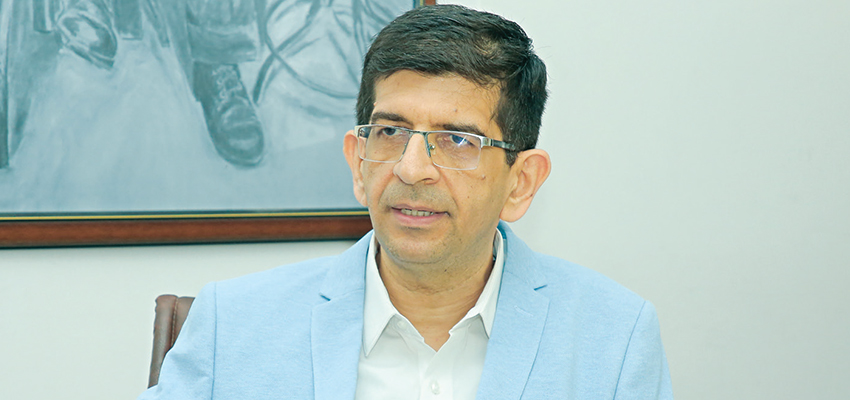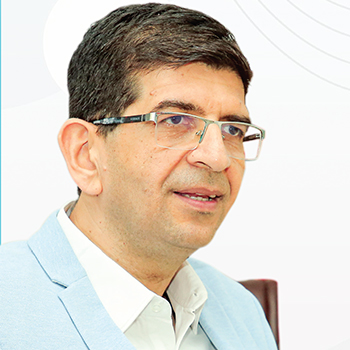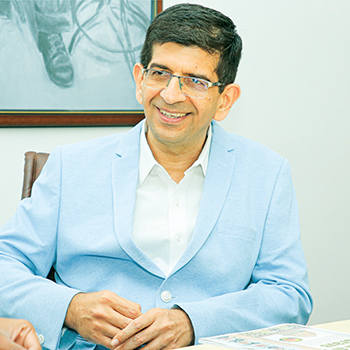Transforming Healthcare Through Telehealth

Anurag Vohra, Chief Technology Officer, Bajaj Finserv Health Ltd, has made significant contributions to the advancements in the use of consumer-facing technology in the healthcare sector. With over 25 years of experience, he has successfully built teams and products from scratch. His business acumen is complemented by his in- depth knowledge of technology and the ability to apply it to real-world business problems. He has built multiple applications that have scaled to millions of users. This ability and his constant zeal have been instrumental in earning him two US patents as well. Corporate Citizen brings you his exclusive interview, highlighting his remarkable career journey, his passion for technology, and his dedication toward making a positive impact in the healthcare industry. Read on…
"Our vision and mission are to put trusted healthcare and experienced doctors within the reach of the common man. While insurance is an age-old offering, we also wanted to make basic medical services more affordable for people"
-Anurag Vohra
Corporate Citizen: Tell us about your current work as CTO of Bajaj Finserv Health.

Anurag Vohra: I joined Bajaj Finserv Health as CTO in 2019. While my interest and core qualification are in the field of technology, I have had the opportunity of using this knowledge in the field of healthcare. At Bajaj, we focus on making healthcare affordable and accessible to each and every Indian across social strata and geographical locations, and what better way is there to do this than technology.
We are a group of driven individuals that includes 20-year-old interns and veterans with more than 25 years of industry experience. So, you can understand the diversity we bring to the table, both in terms of ways of working, perception of consumer needs and technological tools we can use to make healthcare more user-friendly.
Our vision and mission is to put trusted healthcare and experienced doctors within the reach of the common man. While insurance is an age-old offering, we also wanted to make basic medical services more affordable for people. For instance, one may have an insurance for hospitalisation, but doctor consultation, or OPD visits, and lab tests (even preventive health check- ups) are not usually covered under insurance plans, although they are also financially demanding.
CC: What is OPD insurance, and can you provide a brief explanation about it?
OPD is the outpatient department of a hospital. That means you go there for simple ailments like cough, cold and flu, where you don’t need to stay at the hospital. On an average, an individual would visit a doctor in such an OPD setting, at least once or twice a year. The doctor usually prescribes medicine or certain tests to check for ailments like dengue and malaria; they may also recommend chest X-rays or ultrasounds. These medical expenses are made quite frequently by people in their 20s and 30s. Our goal is to make insurance policies more appealing by covering these expenses as well. People sometimes hesitate buying OPD insurance because they believe that there are very less chances of getting hospitalised, so they will not need this insurance. However, in the current scenario, the cost of these outpatient treatments is increasing. If these costs are not covered by the insurance that a person already has, they try and postpone these expenses; this could lead to a serious health issue in the future. By providing insurance for these tests, we hope to encourage people to be more proactive about their health.
CC: Are people well-informed about this insurance and are they actively availing it?
Yes, this was introduced just 2-3 years back and is becoming popular. We have seen an increase in the number of policies being sold. Other insurance companies have also started to offer the same service due to the rising demand, especially for corporate employees. In countries like the US, Europe, and Australia, OPD coverage is a default provision for multinational companies because even the cost of doctor consultations in these countries is very high. For instance, one consultation can cost $250 compared to around `500 ($6.02) in India. Now, because these multinational companies offer this benefit to their employees who work in other countries, they also want to extend it to their Indian employees. This creates a need for Indian companies to offer similar coverage to maintain parity. However, corporates want a solution that is easy to manage because handling numerous claims in-house can be challenging. This is where we come in, as we want to provide services to corporates, insurance companies, and even individuals, if permitted by the government.
CC: Does AI (Artificial Intelligence) play a significant role in the future of the health sector?
Technology and AI play a crucial role in personalising healthcare. Considering the emergence of technologies like smartwatches and smart rings, a lot of health parameters like your oxygen level can be tracked for every person. One can have the capability of detecting stress, anaemia and other conditions based on a one- minute video of your face which shows your expressions, the colour of your eyes and other factors. If these techniques are validated, we can recommend online testing via online booking for immediate access to such services. We can store health trends for years, monitor the health status and send out notifications if any interventions are deemed necessary. By keeping track of the health information of individuals, we can make personalised recommendations. This is very helpful because, after all, healthcare requires tailor-made solutions; what works for one person may not work for another.
"In any profession, I believe it’s crucial to have a strong sense of ownership. It is not just about having entrepreneurial skills, but rather treating your job as if it were your own company. This means taking responsibility for your actions and looking for ways to improve efficiency and save resources"
CC: What are your future goals with the healthcare sector apart from the use of AI?

In healthcare, I believe there are two main issues we need to address in India. First, when I talk about access, I want it to be easy for someone who is new to a city, to visit the right doctor and get the required tests done. If someone needs a certain surgery, they should be able to identify the best possible surgeon, hospital and surgery option that works for them economically and logistically.
People have different preferences and requirements when it comes to healthcare. So, it's important to provide them with the ability to find and choose the treatment option that works best for them. This is what I call as access.
The second issue is about finance. Healthcare expenses often push people into poverty. They may not have adequate insurance coverage, so they end up taking huge loans or selling off property to cover their medical costs. This is where our financial offerings help. We provide insurance because most people rely on insurance for medical expenses; this typically provides coverage up to `3 lakh. Major surgeries or accidents that require prolonged hospitalisation can cost up to `20-30 lakh. By offering top-up insurance, which is affordable and can be added to the existing corporate insurance, we can ensure that these costs are covered. Many people are unaware that this top-up insurance is actually pretty affordable. For example, a person in their late 30s can get a cover of `50 lakh for a family of 4 people for just `12,000/year. But, people are still reluctant to take advantage of it.
So, if you're in a similar situation where you want to secure your family's medical needs but have limited income, you could consider an insurance that suits your requirements. It depends on how much coverage you want and whether you already have existing cover or savings set aside for healthcare expenses. If you have savings worth a few lakhs (`1-2 lakh) for emergencies but anticipate the need for additional coverage, you should consider a top-up insurance plan where you pay the first `1 lakh, and the insurer covers the rest. This way, the premium remains low. If you expect the insurance to cover the entire `5 lakh, the premium will be higher. However, if you cannot afford extensive coverage, it's still important to have some form of top-up insurance.
Another option is to consider co-pay or deductible plans where you contribute a percentage of the bill (e.g., 15%) and the insurance company covers the rest. This helps in reducing the cost of the premium. There are plans available without co-pay, but they involve a higher premium. So, if affordability is a concern, it's worth exploring co-pay or deductible options to get coverage for bigger expenses without having to pay high premiums every year
CC: Take us through your career journey.
I am a part of the healthcare sector purely by chance, not by choice. My true passion lies in the field of technology and communication. I have always been fascinated by the telecommunications industry because I believe that effective communication is essential for everyone. My journey from being a purely tech guy to becoming a health tech guy started pretty early in life.
While I was pursuing my graduation, I did my internship and most optional courses in telecommunication and networking. My first three startups were focused on telecom and networking, and after I joined Microsoft as Product Manager, I managed all the networking stacks of Microsoft OS.
After that, I joined Apollo, marking my entry into the healthcare sector. I was a part of their tele-health team; my job description required me to work on telecommunications and telemedicine. This worked well for me because I was able to use my domain knowledge of technology and apply it in a different sector. In hindsight, this was the moment that bridged and connected telecom with healthcare in my career journey. This paved the way for more exposure and involvement in the health industry.
Based on my experience, I strongly believe that telehealth has a promising future. The main reason for this is that there is overcrowding of doctors in larger cities and a scarcity of competent healthcare professionals in towns and rural areas. Technology and telehealth can effectively address this issue and bridge the gap by bringing healthcare services to underserved regions.
"When you approach your work with a sense of ownership, you go beyond what is expected of you. Instead of just completing your assigned tasks and leaving early, you ask yourself what more you can do. The more effort and dedication you put into your work, the more you will learn and gain the trust of others"
CC: How do you approach people in rural areas for telehealth communication?

At Apollo, we always had public-private partnership projects, thanks to an RFP released by the government of India. They wanted to do something to make healthcare more accessible in rural areas, so they sought partnerships with private companies. In response to this call to action from the government, Apollo’s telehealth division offered bids for these projects. I was part of the technical team that visited several areas, including Jharkhand, Andhra Pradesh, Orissa and Kerala for on-ground surveys based on which we presented our solution ideas to the government. We then implemented our ideas for the areas where our presentation was approved by the government authorities. We were helped by our ground force team and the government during implementation; they also helped us deal with any roadblocks that arose with the local population.
This sort of coordination was really fruitful because when both, the healthcare providers and the government speak the same language, the trust of the local people increases. I think you just have to listen to the people you want to help, address their concerns and convince them that the activities and projects that we have undertaken jointly by the government are for their benefit. This is the best way to go about it although it takes a lot of repeated one-on-one conversations with the beneficiaries
CC: Did you face any obstacles while working in rural areas?
The main issue we faced in rural areas was setting up towers. We had to explain to the local community that we couldn't bring doctors physically to their location, and that telecommunication was the only way that they could speak to health experts.
So, we came up with the idea of installing large TVs in every clinic. This way, when a patient talked to a doctor, he/she could see the doctor's face on a big screen, and this would give the feeling of sitting across the doctor. This idea was inspired by a similar setup that I had seen in a hospital in a rural area. I realised that this approach offered multiple benefits; a local doctor was present for physical examinations, while a specialist doctor could provide instructions remotely. The local doctor could also translate the specialist's instructions into the patient's language. Overall, these arrangements helped patients achieve their desired outcomes.
CC: What is the best part of your work throughout your long career?
Setting up of telehealth enabled clinics in rural and urban slum areas under PPP partnership was the best part of my work throughout my long career. We were able to set up over 100 clinics in the rural areas of Jharkhand, where doctors were not available. Personally, I found this to be the most fulfilling technological solution that I have contributed. This also holds special significance for me as I come from Ranchi, Jharkhand.
I believe another noteworthy achievement was the setting up of telehealth clinics in regions like Himachal Pradesh, Lahaul and Spiti, which are located at high altitudes and often face power cut and low voltage issues. Providing seamless telehealth services in these areas was a challenge. For these regions, especially Spiti, where we had our highest altitude clinic, we had to rely on satellite internet connectivity. Additionally, during winters, we had to take measures such as placing blankets on the UPS and the computers to keep them running at temperatures as low as -20°C or -25°C.
When solving problems, the primary focus should always be on ensuring that healthcare reaches those in need. The operational team at Apollo did an exceptional job in overcoming these obstacles. The identification of areas requiring healthcare services was typically done by the government, and we worked closely with them. We aligned our efforts with the government's priorities and went where they needed us to work. This collaborative approach ensured a win-win situation for all parties.
If the government expressed its intent to provide insurance coverage to citizens but lacked the means to prevent fraudulent claims, it could partner with private players like Bajaj who specialise in financing and fraud control solutions. By working together, we could ensure that benefits reached only those who genuinely needed them while identifying and penalising fraudsters. This collaboration between the government and private sector not only benefits the public but also allows us to apply our expertise in managing claims effectively.
Overall, the partnership between the government and private players proves mutually advantageous. The government can fulfil its healthcare objectives, the public can receive essential services, and the private sector could contribute its knowledge and resources. The same stringent checks and measures that we implemented for our private claims could be extended to government claims as well.
"I would advise youngsters and everyone to take a more personalised approach when dealing with their colleagues, superiors and juniors at work. Different individuals have different needs and preferences, so it is important to respect these differences"
CC: How do you maintain your work-life balance?
I believe it is important to prioritise time for everyone, including myself. So, the most important thing on my priority list is to allocate time for my own physical fitness and mental health. I play sports regularly, specifically squash, which I play every day. On weekends, I focus on spending quality time with my family; we go out together whenever possible.
CC: What are the essential qualities that students entering the corporate world or pursuing a career in business should possess?

In any profession, I believe it’s crucial to have a strong sense of ownership. It is not just about having entrepreneurial skills, but rather treating your job as if it were your own company. This means taking responsibility for your actions and looking for ways to improve efficiency and save resources. For example, simple things like turning off lights when leaving a room can make a difference.
When you approach your work with a sense of ownership, you go beyond what is expected of you. Instead of just completing your assigned tasks and leaving early, you ask yourself what more you can do. The more effort and dedication you put into your work, the more you will learn and gain the trust of others. As a result, you'll be given more challenging tasks, which will allow you to continue growing professionally. It's important to understand that growth and progress only come from actively engaging in your work and pushing yourself to do more, rather than avoiding or minimising your responsibilities.
CC: What advice you want to give to the young generation?
I would advise youngsters and everyone to take a more personalised approach when dealing with their colleagues, superiors and juniors at work. Different individuals have different needs and preferences, so it is important to respect these differences and treat a person in a way that is most relatable and therefore effective for him/her.
Also, make sure that you enjoy whatever it is that you are doing. If your current project is not that exciting, find ways to make it more interesting or see if you can be involved in something that is more stimulating. Try different things and find out what makes you the happiest and most passionate at work. Do internships, take up tasks and projects that are not directly related to your domain to understand your interest area. Give all domains a fair shot to narrow down on what you like the most. Bottom line is: don’t do anything half-heartedly. Give it your 100% and for that, find something that inspires you to give your best every day.